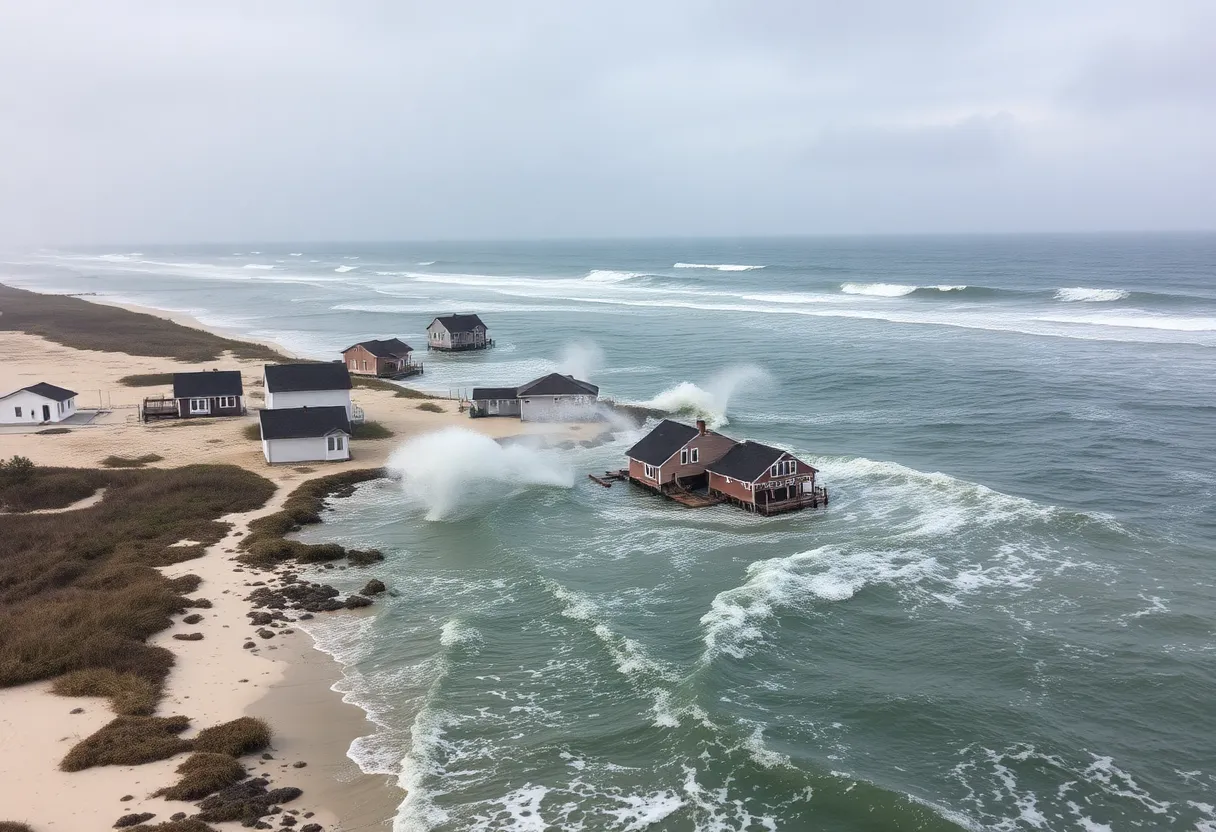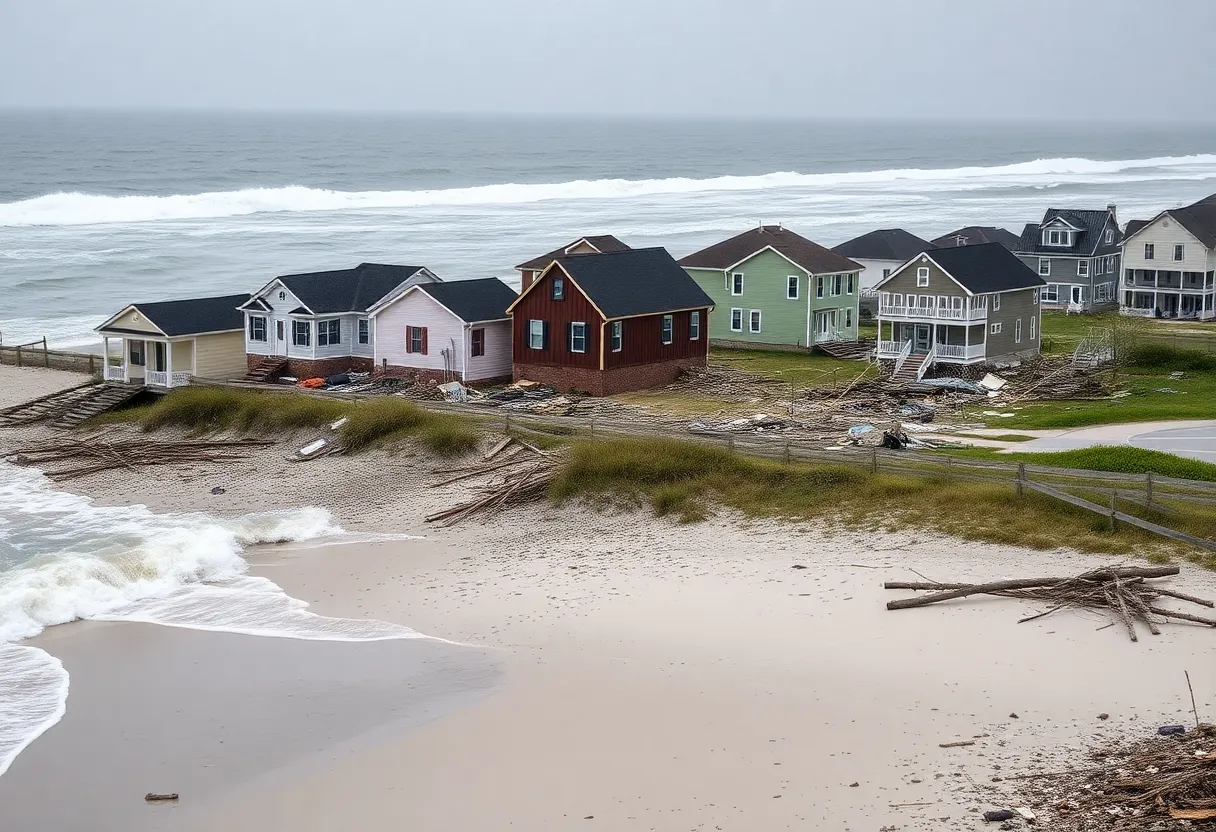Rodanthe, N.C. Faces Urgent Threats from Ocean Erosion
In the picturesque coastal town of Rodanthe, North Carolina, locals are grappling with a serious situation that has coastal property managers on high alert. The ongoing battle against ocean erosion has taken a turn for the worse, prompting calls for immediate action from the National Park Service.
Houses in Danger of Collapsing into the Ocean
It all started when a house at 23039 G A Kohler Court fell into the ocean earlier this week, marking the third house to go down since last Friday. To put this in perspective, this incident is significant as it brings the total number of homes that have collapsed in Rodanthe to ten over the past four years alone. Dave Hallac, the Superintendent of the National Park Service, reached out to the Outer Banks Association of Realtors on Tuesday evening, urging property managers to conduct daily inspections of vulnerable properties. “The situation is extremely dangerous,” Hallac warned, noting that debris from collapsed homes is now scattered across the waters and beaches.
In addition to homes near the ocean’s edge, Hallac expressed concerns about the many exposed septic systems in nearby Buxton, highlighting an alarming trend where children were seen playing dangerously close to these hazardous areas. Such conditions raise serious questions about the safety of visitors enjoying the beautiful yet treacherous landscapes of the Outer Banks.
Rising Waters and Increasing Risks
The recent collapses have not only caused environmental hazards, but they have also sparked fears that certified homes might soon join the ranks of the fallen. Hallac conveyed a pressing message to the realty group: “Some homes that are certified for occupancy could be impacted before Dare County inspectors can perform their daily inspections.” This means that property managers face the daunting task of either physically inspecting their properties or reaching out to Hallac’s office for updates, a necessity that speaks to the urgency of the situation.
A Collaborative Approach to Address Erosion
In light of these alarming circumstances, the N.C. Department of Environmental Quality recently released a report titled “Managing Threatened Oceanfront Structures: Ideas from an Interagency Work Group.” This report emphasizes the need for collaborative efforts among local, state, and federal entities to tackle the escalating challenges brought on by coastal erosion, especially as forecasts indicate worsening conditions due to rising sea levels.
DEQ Secretary Elizabeth S. Biser illustrated the gravity of the issue by stating, “Over the last few years, several homes on our coast have collapsed into the ocean creating environmental hazards and costly cleanups.” The report also outlined several proactive strategies to prevent further property damage. Among these ideas is the call for increased funding for the N.C. Public Beach and Waterfront Access Grants Program.
Funding Shortfalls and Future Plans
Currently, this vital grant program receives only about $1.5 million annually, which is often far below the total funding requests submitted by local governments—sometimes exceeding $3 million. Increasing this funding could open doors for initiatives that would help identify and remove homes at high risk of collapse, ultimately creating new or improved beach access points for the community.
As future measures are discussed, a potential pilot program could focus on enhancing collaboration between local governments and property owners to identify opportunities for the removal of at-risk structures. Such efforts can aid in restoring public access and ensure that visitors and locals alike can safely enjoy the beauty of the area.
In conclusion, while the beauty of Rodanthe draws many people to its shores, the threats posed by coastal erosion highlight the urgent need for action. With homes disappearing into the sea, residents and authorities alike must band together to find practical solutions that prioritize safety and preserve access to the beloved shoreline.

Author: STAFF HERE OUTER BANKS WRITER
The OBX STAFF WRITER represents the experienced team at HEREOBX.com, your go-to source for actionable local news and information in the Outer Banks, Dare County, and beyond. Specializing in "news you can use," we cover essential topics like product reviews for personal and business needs, local business directories, politics, real estate trends, neighborhood insights, and state news affecting the area—with deep expertise drawn from years of dedicated reporting and strong community input, including local press releases and business updates. We deliver top reporting on high-value events such as the Outer Banks Seafood Festival, NC VIP Fishing Tournament, and NCBBA Red Drum Tournament. Our coverage extends to key organizations like the Outer Banks Chamber of Commerce and Outer Banks Community Foundation, plus leading businesses in tourism, retail, and hospitality that power the local economy such as Kitty Hawk Kites, Outer Banks Mall, and Avon Fishing Pier. As part of the broader HERE network, including HEREAsheville.com, HERECharlotte.com, HEREGreensboro.com, and HERERaleigh.com, we provide comprehensive, credible insights into North Carolina's dynamic landscape.





